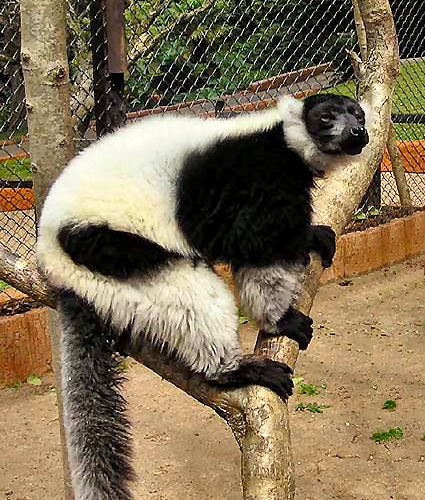Det finns en kampanj som riktar kritik mot Karolinska Institutet för att de genomför djurförsök av primater. Denna fråga är en kampanj som djurorganisationer gillar att driva. Den ger donationer och många medlemmar. Det är en kampanj som många kan ansluta sig till. Varför? De allra flesta gillar apor och hatar att se apor bli utsatta för lidande. Och för det andra, det är enkelt att kritisera andra för något som man själv inte deltar i. Det är enkelt att delta i en kampanj mot djurförsök, eftersom man själv inte arbetare som en forskare på ett laboratorium.
Så ickeveganer sitter runt lunchbordet eller demonstrerar utanför Karolinska Institutet. De äter kött, mjölk och ägg, bär sina läderskor, sin ulltröja, läderskärp och kritiserar forskare för att använda sig av djurförsök. Dessa personer har alltså betalat för att djur ska utnyttjas, skadas och dödas för att de gillar smaken av mejeriprodukter, bacon, ägg eller andra djurprodukter, eller för att de är för lata/bekväma för att köpa något annat. Eller kanske helt enkelt för att de är av den falska tron att vi behöver animaliska livsmedel för att leva ett sunt liv. De flesta djurorganisationer talar i princip aldrig klarspråk i denna fråga, och fokuserar så mycket på behandling, att de vilseleder dessa personer till att tro att de gör djuren en tjänst om de köper "ekologiskt kravmärkt kött", "kravmärkt mjölk", etc.
Dessa förvirrade och säkert välmenade personer kritiserar forskare för att använda sig av djur för att bota sjukdomar, som f.ö. till stor del är orsakade av vår konsumtion av animaliska livsmedel och andra destruktiva levnadssätt.
Hur kan man förvänta sig att det ska bli ett slut på användandet av djur för att bota sjukdomar, som många menar är ett nödvändigt ont, när 99% av vårt samhälle dagligen utsätter djur för onödigt lidande för "underhållning" i form av zoon och cirkusar, läder, ull, päls, kött, mejeriprodukter, ägg, djurtestade hygienprodukter med animaliska biprodukter, etc?
Karolinska Institutet serverar animaliska livsmedel till sina studenter. 99% av befolkningen utsätter djur för onödigt lidande dagligen. Men här sitter dessa ickeveganer och känner att de är goda djurvänner för att de signerar underskriftslistor eller deltar i demonstrationer, utan att de förstår att de är en del av problemet. Det är de som behandlar djur som resurser, och betalar för paradigmet som möjliggör att djurförsök sker. Världen kommer inte förändras av att personer lever en livsstil av hyckleri, eller av att godhjärtade personer blir klappade på axeln och känner sig som hjältar, när de istället borde konfronteras med det lidande som de dagligen betalar för. Om en person deltar i demonstrationer mot andras djurförtryck, t.ex. delfinslakten i Japan, kan man enkelt gömma sina skuldkänslor över sitt eget.
Om du är vegan: När du inte var vegan - trodde du då att det var en moralisk skillnad mellan djurförsök och uppfödning av pälsdjur jämfört med konsumtionen av kött, mejeriprodukter, ägg och andra produkter som du dagligen använde dig av? Om du trodde det - berodde det då till stor del på djurorganisationer med välmenande personer som skapade vilseledande kampanjer? Berodde det på kampanjer som skapar den falska föreställningen om att det är en moralisk skillnad mellan det djurförtryck som 99% av befolkningen deltar i, jämfört med det djurförtryck som denna befolkning upprör sig över? Är det inte fullständigt vilseledande att arrangera fackeltåg med tusentals personer, och en majoritet ickeveganer, som protesterar mot utnyttjandet av minkar för att sedan gå hem till middagsbordet och utnyttja andra djur? Självklart kommer gemene människa på gatan tro att det är en moralisk skillnad mellan pälsindustrin, jämfört med det djurförtryck som denne person deltar i dagligen.
Frågan är om vi vill förespråka veganism, eller vilseledande speciesism? Speciesism = diskriminering av individer av en annan art.
En speciesistisk kampanj är en kampanj som skapar föreställningen att t.ex. en primat är moraliskt sett mer värd än en råtta. Vilseledande och speciesistiska kampanjer som skapar föreställningen att det är en moraisk skillnad mellan olika djurförtryck kommer inte att leda till en vegansk värld. Vegansk utbildning i alla dess ickevåldsamma och kreativa former däremot kommer att leda till en vegansk värld.
Bryr du dig om djur? Menar du att det är fel att skada djur utan god anledning? Anser du att djur betyder något moraliskt sett? Då finns det bara ett rationellt svar till den övertygelsen: Sluta att använda dig av och utnyttja djur för mat, kläder, "underhållning" och alla andra syften. Bli vegan. Läs mer här: http://bloganders.blogspot.no/2014/03/varfor-veganism-varfor-inte-mjolk-lader.html
Mer läsning om djurförsök och den etiska frågeställningen: http://bloganders.blogspot.no/2013/06/ar-det-etiskt-ratt-att-gora-djurforsok.html
Till sist vill jag rekommendera några resurser:
Det här är en jättebra podcast om de moraliska problemen med kampanjer som fokuserar på ett sorts djurförtryck:
https://www.youtube.com/watch?v=__oszGN5PjM
Sverige blir veganskt om du utbildar andra om veganism:
http://bloganders.blogspot.no/2014/03/fortsatta-att-dela-om-veganism-det.html

